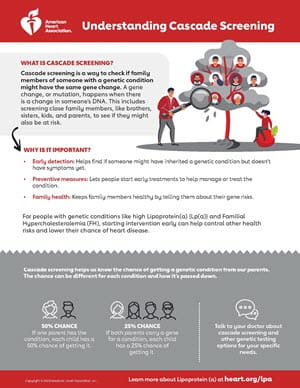Genetic Conditions

There are genetic or inherited heart conditions related to lipoproteins (particles made of protein and fat that help transport cholesterol in your body). This means that some people inherit genes from their mother, father or both that can lead to high levels of certain types of lipoproteins.
Familial hypercholesterolemia (FH) is an inherited defect in how the body recycles LDL (bad) cholesterol. As a result, LDL levels in the blood remain very high. People with FH are born with already high LDL levels and without treatment, they are at risk for early heart disease. There are two types of FH: homozygous familial hypercholesterolemia and heterozygous familial hypercholesteremia.
High lipoprotein (a) (Lp(a)) levels are also inherited from your family. High levels of Lp(a) are a common independent risk factor for heart disease.
What is cascade screening, and why is it important for identifying genetic conditions?
Cascade screening is a method used to identify individuals within a family who may be at risk of inheriting specific genetic conditions. It involves screening close relatives of a person diagnosed with a specific genetic condition to determine if they also have the same genetic mutation.
In the case of familial hypercholesterolemia and elevated Lp(a), early intervention can help manage LDL cholesterol levels and reduce the risk of cardiovascular disease.






